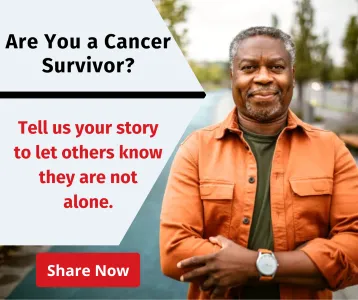3 Tips to Remember for National Cancer Survivors Day

Editor's Note: This blog was originally published in June 2021 and has been updated.
There are more than 17 million cancer survivors in the United States. This number continues to grow as we discover better ways to diagnose and treat cancer. Held every year on the first Sunday in June, National Cancer Survivors Day is a celebration for cancer survivors and an inspiration for those who have recently been diagnosed with cancer. It’s also a time to raise awareness about the challenges of survivorship, which can include worries about recurrence.
“One piece of advice I can share is that you have to live your life,” shares Delisa, a breast cancer survivor. “There were times when I would worry myself sick, wondering if I would have a breast cancer recurrence, and that is definitely not living your best life. Dance, laugh, take that fabulous vacation to the beach (I did), volunteer your time. Just continue to live your life!”
The word “survivor” means different things to different people, but whether you use the term “survivor” or prefer a word like “warrior,” the idea is the same. Being a survivor means taking an active, positive role in your own care. In recognition of National Cancer Survivors Day, we’ve gathered 3 tips for navigating survivorship along with words of inspiration from cancer survivors like Delisa.
“I never really thought of myself as a very strong person. That changed when I was diagnosed with cancer. I realized I was strong enough to handle anything thrown my way.”
― Laurie, cancer survivor
1. Develop a survivorship care plan to help you and your loved ones.
If you have recently finished or are preparing to finish active cancer treatment and you are not sure what comes next, a survivorship care plan can help. Survivorship care plans are individualized plans that can help cancer survivors monitor their health. A survivorship care plan can:
- Detail your diagnosis
- Outline the treatments you have had or are currently taking
- Tell you who to contact on your healthcare team with questions or concerns
- Explain symptoms or side effects you might experience
- Indicate who to call if you need help managing side effects
- Outline what you should do and who you should see for follow-up care
Discover More About Survivorship Care Planning
“Wow, my life has changed drastically, and I am very sad about it. But on a good note, I am learning through cancer counseling to focus on enjoying each day. Being ‘present’ with the people who are most important in my life brings me a lot of happiness.”
― Sharletta, metastatic breast cancer survivor
2. Connect with others like you.
Find support and inspiration among others who are going through similar experiences, whether you are newly diagnosed or making the transition to life after treatment. Our private discussion boards for people impacted by cancer cover a wide range of topics, including nutrition and wellness, coping with treatment side effects, and post-treatment survivorship.
“It’s always helpful to speak with other people who are dealing with the same (and ridiculous) issues, because others may try to understand, but it’s different when it is YOU going through it,” notes Kristen, a brain cancer survivor who participated in our Post-treatment Survivorship discussion board. “I got a lot of questions answered from this community regarding after treatment, and it was invaluable.”
Tammy, a non-small cell lung cancer survivor, also found comfort on our discussion boards. “I value knowing I'm not alone in this journey and all I have to do is go online and share what I’m feeling,” she notes.
Connect to Your Online Community
“My children have inspired me, my doctors have inspired me, and the people that I met going through the same thing inspire me; we are in this world together.”
― Ruby, cancer survivor

3. Make good nutrition an important part of your care beyond cancer treatment.
After many months of treatment and medical appointments, you may feel different now that you have more time to focus on your well-being. While exciting, this can also cause a mix of emotions. The good news is nutrition can help you to take control of your health. Following a healthy diet can help with:
- Recovery and healing
- Regaining strength and weight
- Managing ongoing side effects
- Reducing risk of a future cancer diagnosis
- Maintaining a healthy weight
Aim to “eat the rainbow.” Consider the different colors of fruits and vegetables when determining the best foods to eat. Common foods that provide phytonutrients for cancer prevention include cherries, tomatoes, berries, cruciferous vegetables, and bran from grains. Find more tips in our booklet Eating Well for Cancer Survivors.
Get Details About Nutrition During Cancer Treatment
Explore More Survivorship Resources & Support
Survivorship requires many things: physical activity, nutrition, a healthy emotional life, and management of any health concerns that may arise. You can improve your quality of life by addressing these factors together in an active way. The following resources may help you achieve the highest quality of life after treatment has ended.
- Find more information about cancer survivorship, including resources to help you navigate your journey.
- Connect with our Cancer Support Helpline by phone or online via our live chat service. Our experienced Helpline staff are here to offer free navigation for cancer patients or their loved ones.
- Create a private support website where you can document your journey and receive support from friends and family along the way.
- Find a caring and supportive CSC location near you. We have 196 locations worldwide, including 52 licensed affiliates and healthcare partnerships.
"My suggestion is find a [support] group if you haven’t, and if you have, participate. It is helpful."
— Lisa, metastatic melanoma survivor
Survivorship can feel daunting and overwhelming. Try to focus only on today's problems. Even if your cancer journey is complicated, you can set small goals and enjoy daily pleasures. Take time to enjoy the moment. Listen to music, read a book, or take a walk. Yoga, tai chi, or meditation programs are also helpful. Your family, culture, or spiritual beliefs may help you think about hope in a new way. Avoid thinking about worst-case scenarios for the future. Taking one small step at a time can help you move forward and feel more in control.
“Remember, it's a journey. We are aiming to arrive at a certain place (or time), but sometimes we have to pull off the highway and sit at a rest stop for a while. It's ok to stop and take care of the issue at hand before we get back on the road. It's normal to be frustrated, scared, angry, disappointed when we get derailed. Let yourself feel all of it. Then put it into perspective. You can almost always think of a way it could be worse. When you think about that, be grateful for what you have.”
— Heather, cancer survivor